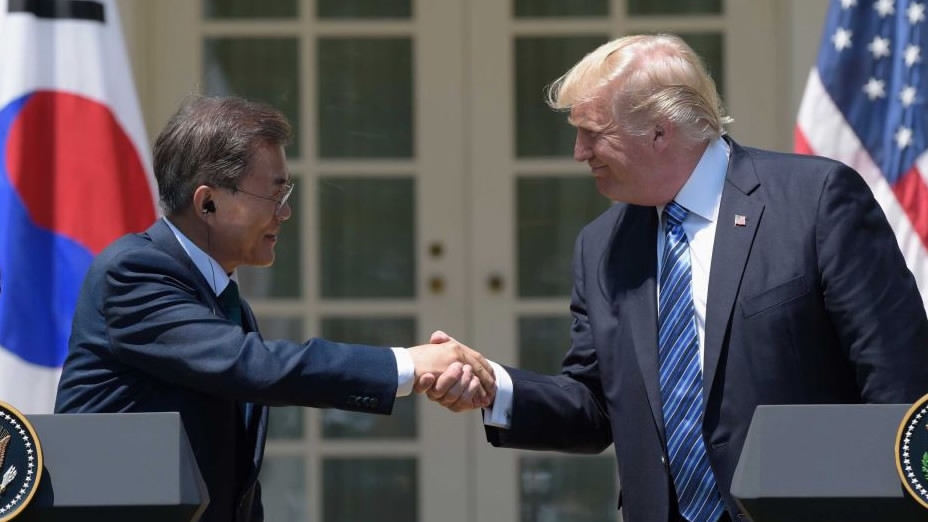US President Donald Trump will arrive in Seoul on Tuesday for a visit designed to highlight the strength of the 67-year US-South Korea alliance.
Trump and South Korean President Moon Jae-in have interacted frequently since the latter assumed office on May 10, but splits on major issues have suggested a sometimes strained partnership.
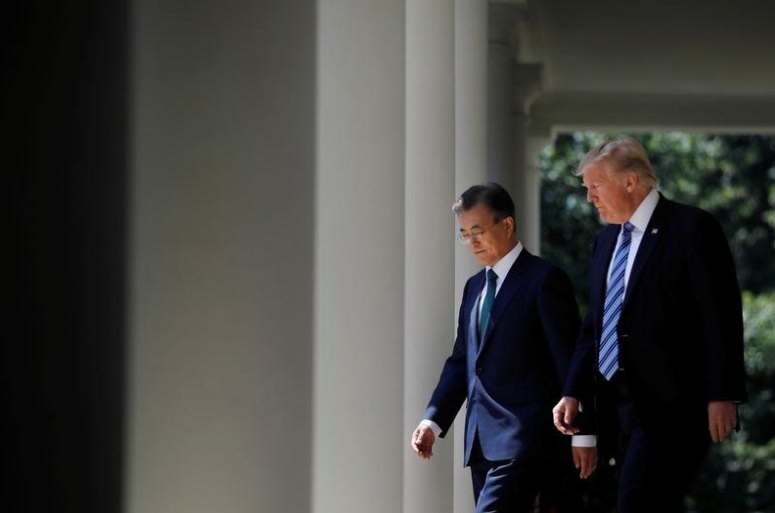
US President Donald Trump (R) with South Korean President Moon Jae-in (L) in the Rose Garden of the White House in Washington, US, June 30, 2017. /Reuters Photo
US President Donald Trump (R) with South Korean President Moon Jae-in (L) in the Rose Garden of the White House in Washington, US, June 30, 2017. /Reuters Photo
'Diplomatic leadership' or 'America first' on DPRK?
No matter how warm the smiles when Moon and Trump meet, the fact that the two leaders are split on how to persuade the DPRK to abandon its nuclear program cannot be masked.
The DPRK has topped the agenda in every communication between the two leaders since Trump called Moon to congratulate him on his election in May.
Phone conversations have been dominated by DPRK's missile and nuclear tests, and featured agreement to increase pressure on Pyongyang.
But Moon has attempted to strike a different tone compared to the previous conservative government, promising in his election campaign to "say no to the Americans."
In his latest parliamentary address on November 1, the South Korean president again argued no military action on the Korea Peninsula would be tolerated without Seoul's consent, adding the government would continue to pursue a peaceful resolution.
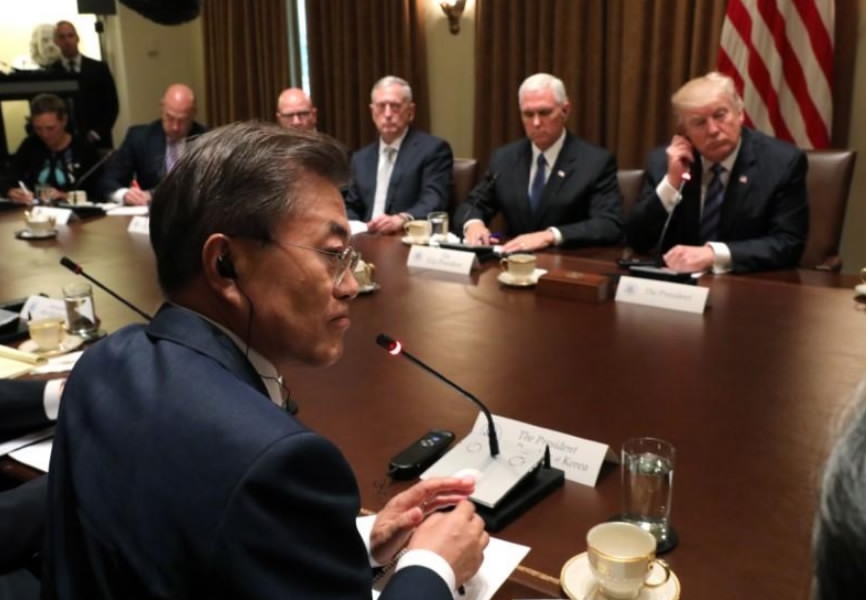
US President Donald Trump (R) and South Korean President Moon Jae-in (L) meet with their delegations in the Cabinet Room of the White House in Washington, US, June 30, 2017. /Reuters Photo
US President Donald Trump (R) and South Korean President Moon Jae-in (L) meet with their delegations in the Cabinet Room of the White House in Washington, US, June 30, 2017. /Reuters Photo
Moon wants to bring the DPRK to the negotiating table to resolve the situation, while Trump has used aggressive rhetoric and rejected dialogue as a route to stability. Experts note Trump has placed de-nuclearization as an ambitious precondition for starting negotiations.
Moon's efforts to strengthen his nation's diplomatic leadership within the alliance contrasts with Trump’s "America first" approach. South Korean media have used the phrase "Korean passing" in reference to a belief that the US has sidelined Seoul on the DPRK nuclear crisis.
Shortest stay on Asia trip
Trump’s state visit to South Korea will last about 24 hours, making it the US president's shortest stay on his East Asian tour. And Trump has surprised experts by not following in former presidents' footsteps in visiting the Demilitarized Zone (DMZ) that borders the DPRK.
Evans Revere, a former senior State Department official for East Asia, expressed his disappointment about Trump's decision. "By not visiting the DMZ, President Trump can only remind our allies, once again, that he does not view our alliance commitments in the same way as did every one of his predecessors."
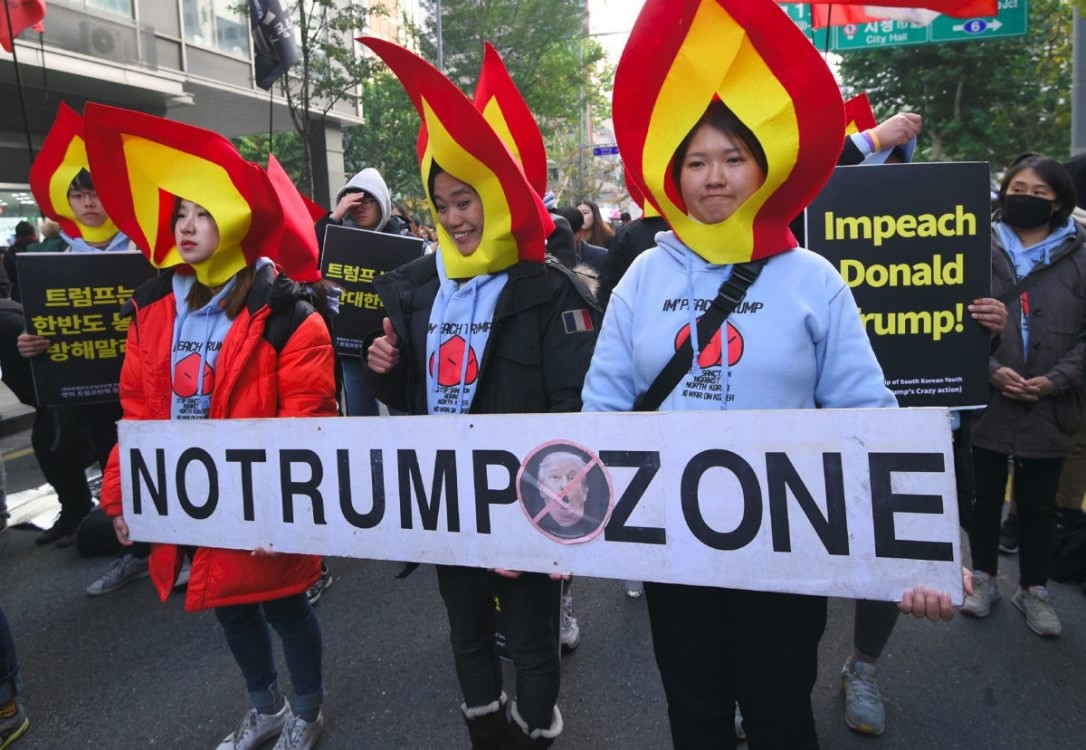
South Korean protectors hold a banner reading "No Trump Zone", during an anti-Trump rally in Seoul, November 4, 2017. /AFP Photo
South Korean protectors hold a banner reading "No Trump Zone", during an anti-Trump rally in Seoul, November 4, 2017. /AFP Photo
Even before Trump was sworn in as president, he accused Washington's security allies of not pulling their weight, with South Korea on that list. He hinted that if Seoul did not pay more for the 28,000 US military personnel in the country, he could pull the troops out.
Meanwhile, according to Deutsche Welle, a coalition of around 220 organizations in South Korea will mobilize thousands of protesters to demonstrate in Seoul during Trump's visit. Yonhap confirmed around 50 applications for protests during Trump's trip have been filed.
The demonstrators told reporters their slogan is "No Trump, No War, People’s Rally", to show their opposition to the US president and their belief that he is escalating tensions in the Korean Peninsula. Agricultural cooperatives also want to discard a trade deal with the US, which they believe has disadvantaged South Korean farmers.
Trump’s KORUS criticisms
Trade will be a controversial issue during Trump's visit to South Korea, as in other countries on his Asian tour.
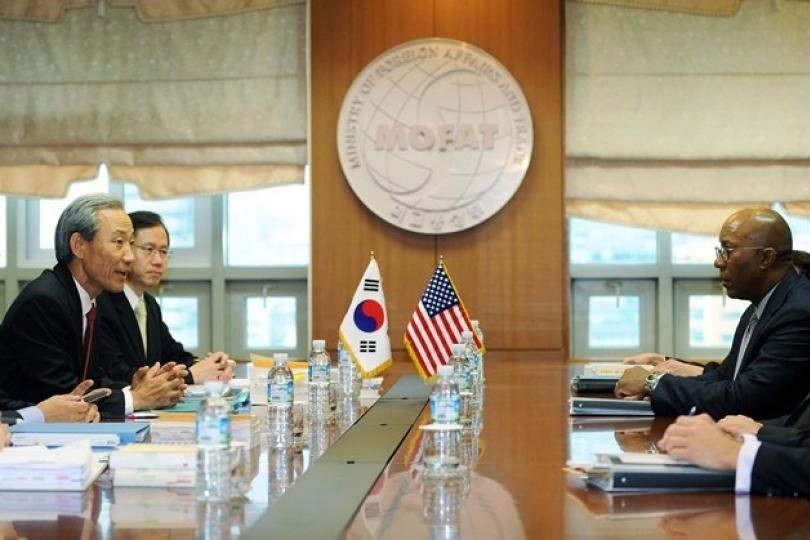
November 8, 2010: South Korean Trade Minister Kim Jong-hoon (L) negotiates with his US counterpart Ron Kirk (R) over KORUS deal during their meeting in Seoul. /Reuters Photo
November 8, 2010: South Korean Trade Minister Kim Jong-hoon (L) negotiates with his US counterpart Ron Kirk (R) over KORUS deal during their meeting in Seoul. /Reuters Photo
South Korea is America's sixth-largest trading partner, with bilateral trade totaling 144.6 billion US dollars in goods and services in 2016. However, the US president has threatened to withdraw from the five-year-old US-South Korean Free Trade Agreement (KORUS), a deal ratified by Trump's predecessor Barack Obama.
In an April interview, Trump called KORUS a "horrible deal." He suggested the terms contributed to the US trade deficit with South Korea, which the United States Trade Representative (USTR) stated has doubled from 2011 to 2016.
The future off the deal was thought to be at risk without renegotiation – Seoul has tentatively agreed to look again at the agreement. While the US is not expected to totally pull out of KORUS, what will happen in the negotiations is still uncertain.
Rajiv Biswas, chief economist at IHS Markit, analyzed the two sides' positions on renegotiation.
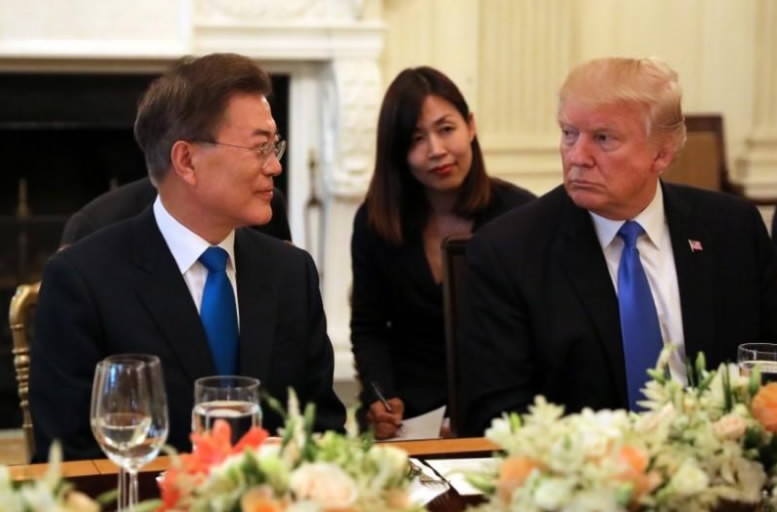
South Korean President Moon attends a dinner with US President Donald Trump in the White House, Washington, US, June 29, 2017. /Reuters Photo
South Korean President Moon attends a dinner with US President Donald Trump in the White House, Washington, US, June 29, 2017. /Reuters Photo
"[South] Korea may want to address agriculture, which has been the source of some domestic strife among local growers. On the US side, tariff and non-tariff barriers against the autos and steel industry may be lowered to provide American industries better access to the Korean market," Biswas said.
Lack of personal chemistry
Trump was the first foreign leader to call Moon to congratulate him on becoming South Korean president, and Moon's first overseas trip as leader was to Washington. The presidents have since held face-to-face talks three times.
The leaders seem to have interacted well at diplomatic events, but some believe the men's different personal experiences make a close relationship unlikely.
Analysts say inhabiting opposing political spheres and coming from vastly different backgrounds make it hard for the two leaders to have good chemistry. Moon was a human rights lawyer defending labor activists and political dissidents before entering politics, while Trump was a businessman and TV personality.
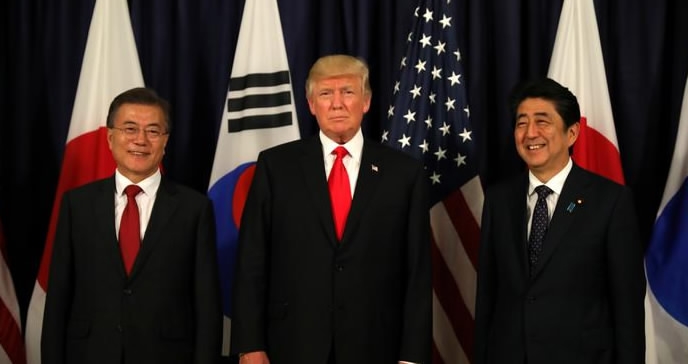
US President Donald Trump meets South Korea's President Moon Jae-In and Japanese Prime Minister Shinzo Abe ahead the G20 leaders summit in Hamburg, Germany, July 6, 2017. /Reuters Photo
US President Donald Trump meets South Korea's President Moon Jae-In and Japanese Prime Minister Shinzo Abe ahead the G20 leaders summit in Hamburg, Germany, July 6, 2017. /Reuters Photo
Some in South Korea don't feel their nation is being placed on an equal footing with Japan by the US, as embodied by the frequency and intensity of phone conversations with leaders of both countries and the fact that Trump will spend less time in Seoul than Tokyo.
Notably, Trump has not nominated an ambassador to South Korea yet. However, he has already sent a US ambassador to Japan.
The December 2015 deal over World War II "comfort women" could also create friction between Moon and Trump if South Korea tries to renegotiate the agreement with Japan. Moon's administration argued a 2015 agreement did not satisfy the public's expectations. Tokyo refused to renegotiate. Which side will Trump stand alongside?

